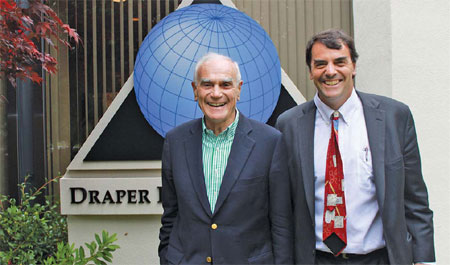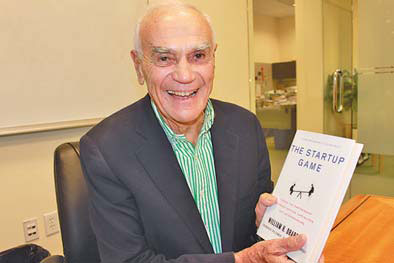A family legacy of venture capitalism
Updated: 2013-03-01 12:35
By Zhang Qidong in San Francisco (China Daily)
|
||||||||
|
Venture capital gurus Bill Draper and his son Tim believe that the Chinese and Americans should be friendly competitors, citing energy and dynamism of both cultures as common grounds. Zhang Qidong / China Daily |
|
Bill Draper said in his book The Startup Game that the meeting with the late Chinese leader Deng Xiaoping in 1981 gave him "a sneak preview" of a far-reaching transformation in China. Zhang Qidong / China Daily |
It is 1959. Bill Draper is driving through the fruit orchards of Sunnyvale and Santa Clara, California, looking for nondescript buildings to house a technology company. Spotting one, he knocks at the door, introduces himself and launches into his sales pitch. When he describes himself and his partner as "venture capitalists", the response is: "What did you say you were again?"
Fast-forward 40 years. Bill Draper witnesses the birth of Silicon Valley, and invests in such soon-to-be successful companies as online real-time restaurant-reservation service Open Table and physician practice management and software services provider Athena Health. He also launches Rediff, the Yahoo of India. Many more investments like this are to come.
Draper is the middle member to three generations of highly successful venture capitalists. His father, William H. Draper Jr, formed the first venture capital firm on the West Coast and the first limited partnership in the venture world.
William Draper inspired Bill to find his own brilliant career in venture capital, and today, Bill's son Tim is expanding the family business globally, putting $100 million into China alone.
Back in 1981, Bill Draper had a chance to meet with Deng Xiaoping, the then 77-year-old Chinese leader who in Bill's words, "has more impact on entrepreneurs than anyone else on this earth."
Draper met Deng at a US business delegation in Beijing. He describes Deng in five words: "Dynamic, dramatic, brilliant, empathetic, and magnetic".
Draper remembers the meeting vividly: "He (Deng) took charge of the room as soon as he walked in, eyes flashing, his smile contagious. He was very interested in everyone and everything we discussed. All of us were just glued to him, under his imminent control."
In his book, The Startup Game, published in 2011, Bill Draper described his meeting with Deng as "a sneak preview" of a far-reaching transformation in China. The Chinese leader, Draper said, astounded the world by "encouraging everyone in China to get rich".
"What he was doing was unleashing his creativity and innovation to change the world. He is the one person who created more entrepreneurs in the entire history of the world," Draper said.
Then, in 1994, Draper visited Asia on a venture capital investment evaluation trip. He picked India as the focus of his Asia investment portfolio - a decision he now regrets.
Draper said he blames himself for not being more perceptive about the tremendous economic development that was going to transform China. He said his global venture map would be very different today if he had chosen China in the early 1990s.
Tim Draper, one of the founding partners of Draper Fisher Jurvetson, followed his father's footsteps to China in 1999. His early investment in China, however, was not impressive.
"We invested in several companies in China that did not go well. We left our money there," Tim Draper said. "After several rounds, we looked at our cards on the table and thought, why don't we invest in young ambitious Chinese guys in Silicon Valley who are from China? So we changed our strategy from there."
And this was when Baidu entered the picture. Robin Li, founder of Baidu, China's Google, impressed the partners at Draper Fisher Jurvetson as a highly intelligent, creative and determined individual with technical experience and US search engine background.
"If we pick the most impressive portfolio we invested in China today, Robin Li is definitely the one with integrity and remarkable leadership, growing Baidu from a raw startup to a market leader in China," Tim Draper said.
Baidu's 2005 IPO enjoyed the biggest opening on the Nasdaq stock market since 2000, surging more than 350 percent in one day. It remains the most successful first-day foreign company IPO in US history.
"I watched China growing from (a country of) low rises to beautiful high-rise skylines; wifi is working everyhere now, in third-tier, even fourth-tier cities," Tim Draper said. "I go back to China every year, and each time I go back, it is a whole new experience. It used to be Chinese starting business in copying American technology. Now it's the Chinese (who) are innovating their own technology and bringing it back to Silicon Valley, and to the US," he said.
Tim Draper said most recent DFJ-funded companies in China are in social media and games. He said he has noticed increasing competition in venture capital investment.
"In Beijing, Shanghai and Silicon Valley, I have seen entrepreneurs growing at a speed I have not seen anywhere else," said Tim, whose DFJ has offices in Beijing, Shanghai, Hangzhou, Wuxi, and Xi'an. "The next fast-growing industry trends we would keep a close eye on are crowd-sourcing, data, and cloud computing."
Other than social media, DFJ also has invested extensively in clean tech, green energy, battery manufacturers, and solar cities in China. "We have local staff selecting projects in China, then we study them and make decisions," Tim Draper said.
Although China is expected to continue its growth in the years to come, DFJ's global strategy will remain unchanged: 60 percent originating in Silicon Valley, 10 percent in China, and the rest in Europe, Tim Draper said.
Bill and Tim Draper both emphasize the importance of entrepreneurship. To that end, Tim's "Draper University of Heroes" takes on 40 selected budding entrepreneurs at a time, from all over the world, in a pilot program. The universit in Menlo Park aims to provide unique entrepreneurship training to the participants.
"If you examine the success of entrepreneurship, innovation and economic development are best nurtured where there is a fine university in the neighborhood," said Bill Draper.
"Without Stanford, there is no Silicon Valley today, just like Google coming from the ideas of two Stanford graduates and Facebook coming from Harvard (University students)." Bill Draper said. "That is why Draper University was founded by Tim. It would be the same idea for China. The pattern is very similar: the universities harbor their graduates to become entrepreneurs, money is made by the entrepreneurs and invested back in the university," Bill said.
"I am convinced that Chinese and we Americans are similar in so many ways, very dynamic and energetic in our spirit. Now China has a free economy. It will dominate the world in so many ways," Bill Draper said. "America will continue to be a powerful economic force, but China has a much better and larger economy. It gets better if doors are opened. We (China and the US) should be friendly competitors, since we have very similar approaches, people to people."
Citing his father as a significant influence on his life, character and success, Bill Draper said an important lesson about venture capital is never to invest any money that one cannot afford to lose, because venture capital is a risky business. One needs to "spread the risk, always save something for a rainy day, and work hard enough to make good things happen", he said.
"We are in a business that captures a lot of the pain, joy, suspense, frustration, and elation as we are closing or failing to close a deal," Draper said. "It underscores the fundamental fact that in venture capital, you are going to win some, and you are going to lose some."
Win or lose, when the history of the US business community is written, the family name of Draper might well be grouped with other important names, such as John D. Rockefeller, Alfred Sloan, Henry Ford, and Carnegie & Mellon.
After three generations of venture capital investment, Tim Draper's son, Adam, the fourth generation member, has rolled out a new startup incubation platform called Boost Funder in San Mateo. Meanwhile, Jessie Draper, Tim's daughter, has launched a fun Internet talk show named "The Valley Girl", featuring interviews with some of the biggest names in business and technology, in Silicon Valley.
The Drapers' entrepreneurial spirit seems likely to continue flourishing for generations to come.
kellyzhang@chinadailyusa.com
(China Daily 03/01/2013 page10)

 In Photos: 7.0-magnitude quake hits Sichuan
In Photos: 7.0-magnitude quake hits Sichuan
 Li Na on Time cover, makes influential 100 list
Li Na on Time cover, makes influential 100 list
 FBI releases photos of 2 Boston bombings suspects
FBI releases photos of 2 Boston bombings suspects
 World's wackiest hairstyles
World's wackiest hairstyles
 Sandstorms strike Northwest China
Sandstorms strike Northwest China
 Never-seen photos of Madonna on display
Never-seen photos of Madonna on display
 H7N9 outbreak linked to waterfowl migration
H7N9 outbreak linked to waterfowl migration
 Dozens feared dead in Texas plant blast
Dozens feared dead in Texas plant blast
Most Viewed
Editor's Picks

|

|

|

|

|

|
Today's Top News
Live report: 7.0-magnitude quake hits Sichuan, heavy casualties feared
Boston suspect cornered on boat
Cross-talk artist helps to spread the word
'Green' awareness levels drop in Beijing
Palace Museum spruces up
First couple on Time's list of most influential
H7N9 flu transmission studied
Trading channels 'need to broaden'
US Weekly

|

|









